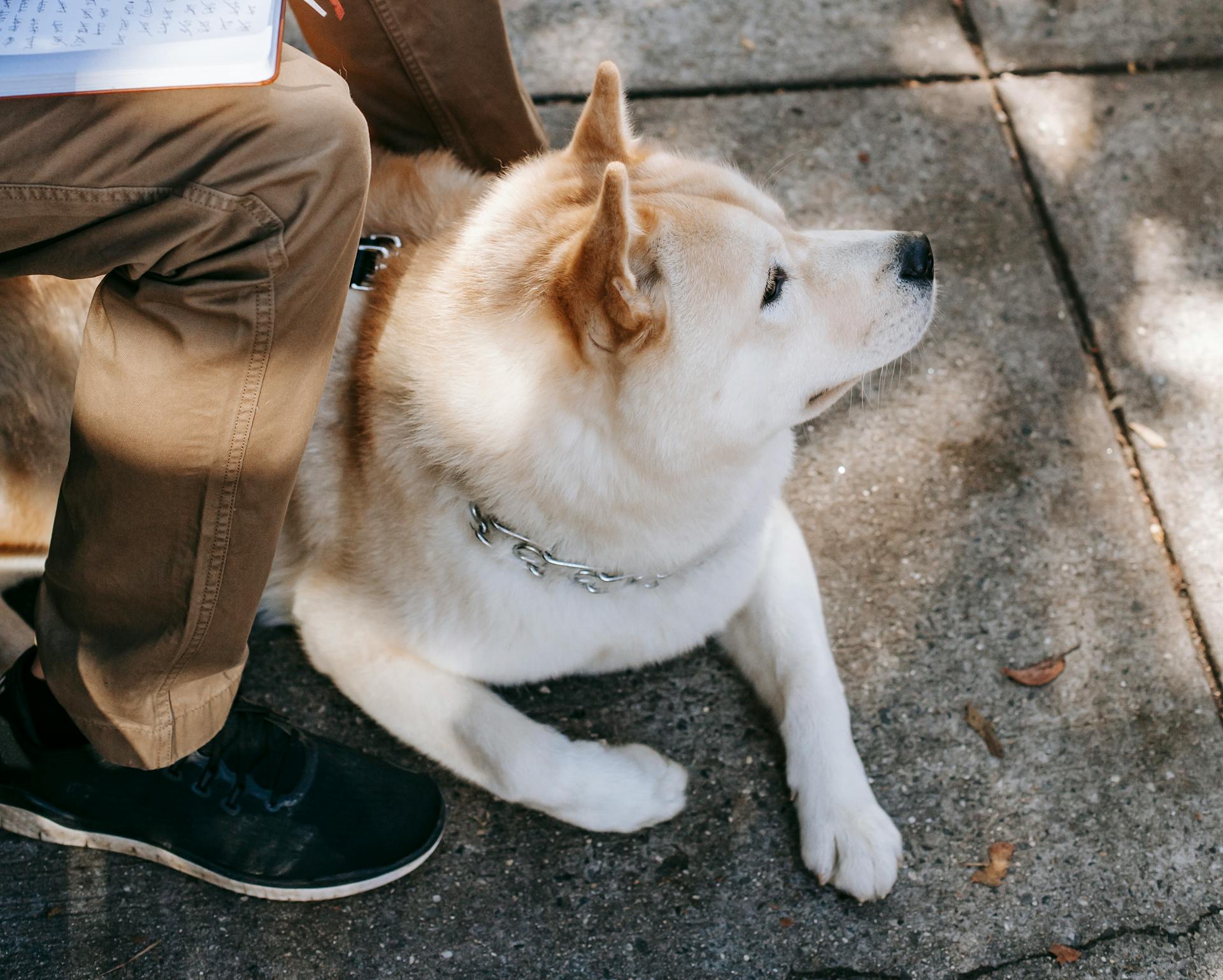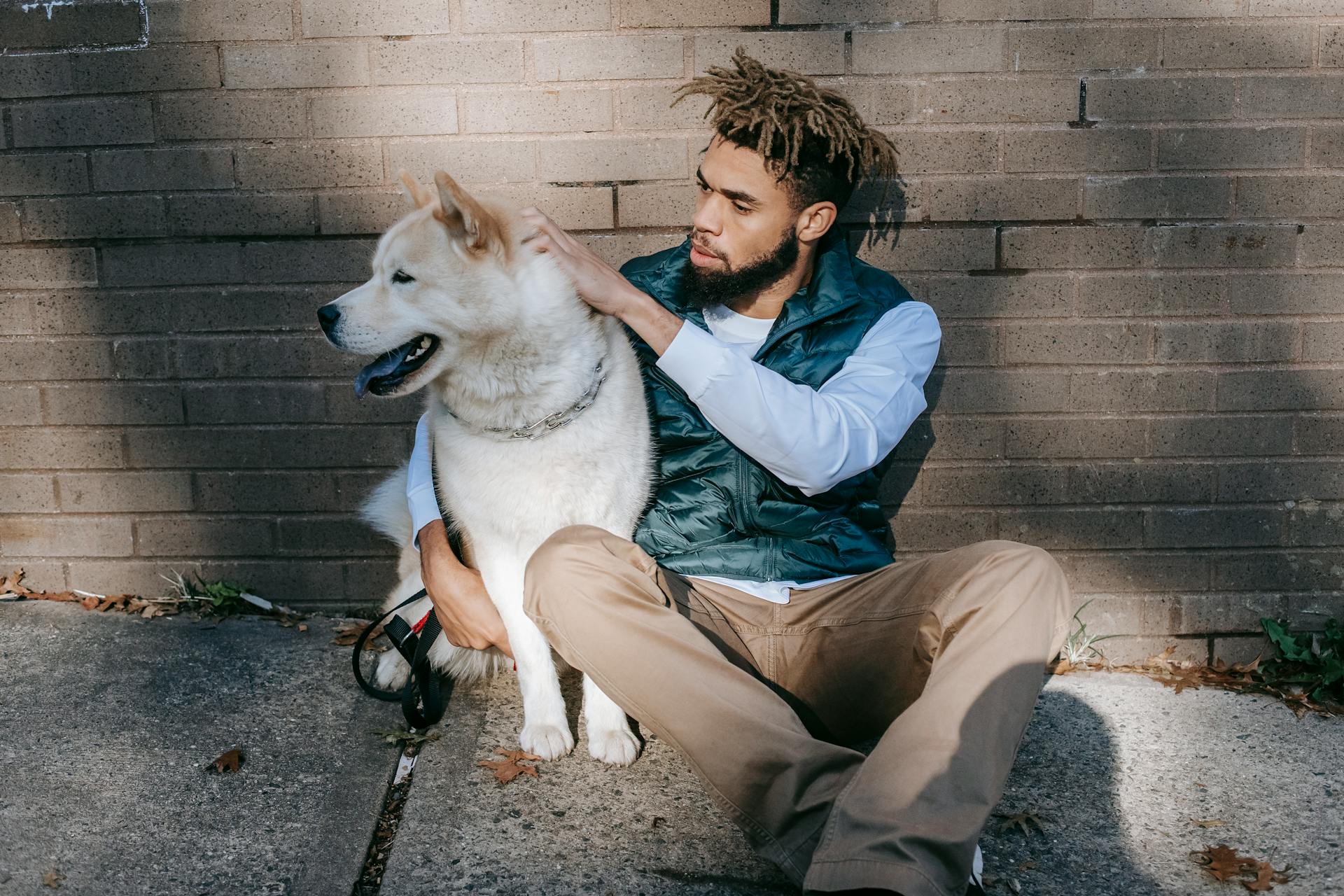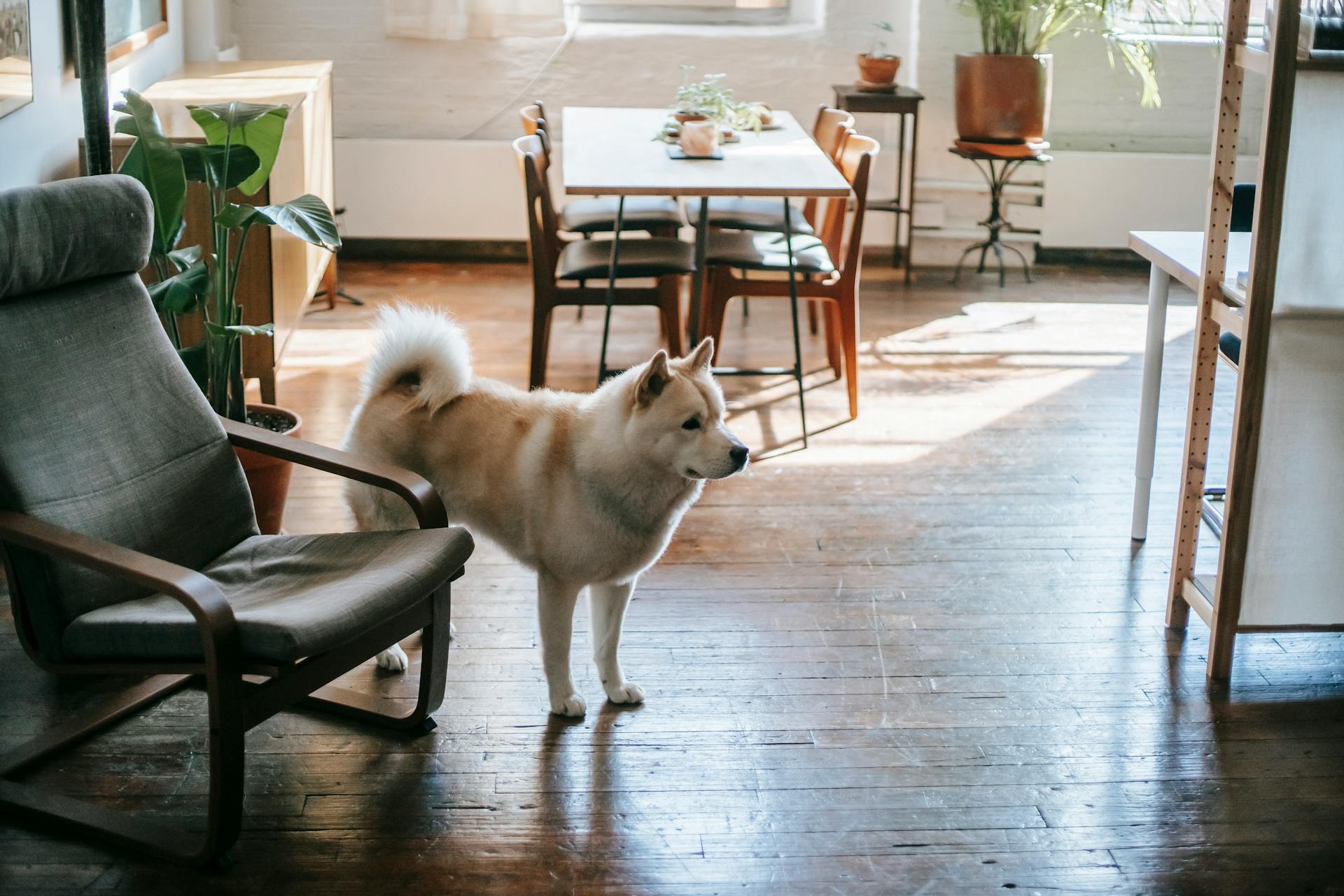
The Akita Inu is a majestic breed known for its loyalty and intelligence, but like all dogs, it's not immune to health issues. Hip dysplasia is a common problem in Akitas, caused by a genetic defect that can lead to arthritis and mobility problems.
Regular exercise and a balanced diet can help prevent hip dysplasia, but some Akitas may still develop the condition. Akitas are also prone to certain types of cancer, including gastric cancer, which is a leading cause of death in the breed.
To prevent gastric cancer, it's essential to feed your Akita a balanced diet that includes plenty of fiber and omega-3 fatty acids. Akitas are also at risk for hypothyroidism, a condition where the thyroid gland doesn't produce enough hormones.
Discover more: Boxer Breed Problems
Eye Issues
Akitas are prone to progressive retinal atrophy, an eye disease that appears within the first years of life and eventually renders affected dogs completely blind.
This inherited condition is not painful, but it's not curable either. A genetic test is available to identify dogs with the bad gene.
Recommended read: My Dogs Not Eating and Is Lethargic
Early symptoms of progressive retinal atrophy include night blindness and dilated pupils, which can start appearing around three to five years of age.
Glaucoma is another painful eye condition that affects Akitas and can rapidly lead to blindness if left untreated.
Symptoms of glaucoma include squinting, watery eyes, bluing of the cornea, and redness in the whites of the eyes. In advanced cases, the eye may look enlarged or swollen.
Glaucoma is a medical emergency, and it's essential to seek veterinary attention immediately if you notice any of these symptoms.
Cataracts are a common cause of blindness in older Akitas, and they occur when the lenses of the eyes become more opaque.
Many dogs adjust well to losing their vision and can still live happy and healthy lives. Surgery to remove cataracts and restore sight may also be an option.
Here are some common eye issues that Akitas may face:
- Progressive Retinal Atrophy (PRA)
- Glaucoma
- Cataracts
Gastric Issues
Gastric Issues are a serious concern for Akita owners. Gastric volvulous, also known as gastric torsion, affects many large breeds, including the Akita.
Symptoms include restlessness, attempts to vomit with no results, abdominal pain, excessive salivation, whining, and obvious discomfort. These symptoms can be distressing for both the dog and the owner.
If left untreated, gastric volvulous can be fatal. Emergency surgery is the only treatment that can save the lives of affected dogs.
Health and Care
As an Akita owner, it's essential to be aware of the potential health problems that can affect your furry friend. Akitas are prone to genetic health issues, which means that some conditions are more common in this breed than others.
Brushing your dog's teeth daily is crucial to prevent periodontal disease, a common issue in Akitas.
Regular exercise and a balanced diet are also vital to maintaining your Akita's overall health. Akitas are large dogs with lots of energy, so they need plenty of physical and mental stimulation to prevent boredom and destructive behavior.
Here are some key things to remember when it comes to your Akita's routine care:
- Supervise your pet as you would a toddler, keeping doors closed and blocking off rooms as necessary.
- Brush your Akita's coat at least weekly, and their teeth at least three times a week.
- Clean your Akita's ears weekly, even as a puppy.
- Keep your Akita's diet consistent and avoid giving them people food.
- Feed a high-quality diet appropriate for your Akita's age.
- Exercise your Akita regularly, but don't overdo it at first.
Signing up for pet health insurance is also a crucial step in caring for your Akita. This will help you cover the costs of medical tests and procedures that your dog may need throughout their life.
Remember, regular check-ups and vaccinations are essential to maintaining your Akita's health. By working closely with your veterinarian and following these simple tips, you can help your Akita live a long, happy, and healthy life.
Infections and Parasites
Akitas are susceptible to bacterial and viral infections, such as parvo, rabies, and distemper. Many of these infections are preventable through vaccination, which we will recommend based on the diseases we see in our area, her age, and other factors.
Some of these infections can be serious and even life-threatening, so regular check-ups and vaccinations are crucial.
Parasites can also invade your Akitas body, inside and out, and can be transmitted to you or a family member.
Curious to learn more? Check out: Ear Infections in Goldendoodles
Infections
Akitas are susceptible to bacterial and viral infections, the same ones that all dogs can get, such as parvo, rabies, and distemper.
Many of these infections are preventable through vaccination, which we will recommend based on the diseases we see in our area, her age, and other factors.
Preventing infections is crucial, especially for Akitas, as these diseases can be life-threatening if left untreated.
Vaccination is a key part of preventing infections, and we will work with you to develop a vaccination schedule that's tailored to your dog's needs.
Akitas are also susceptible to other infections, such as parvo, rabies, and distemper, which are all preventable through vaccination.
By following a recommended vaccination schedule and taking other preventative measures, you can help keep your Akitas safe from infections and ensure they live a long and healthy life.
Discover more: Canine Distemper Symptoms in Puppies
Parasites
Parasites can invade your Silent Hunter's body, inside and out, causing pain, discomfort, and even death.
Fleas, ticks, and ear mites can infest her skin and ears, while hookworms, roundworms, heartworms, and whipworms can get into her system through contaminated water, soil, or an infected mosquito bite.
Some parasites can be transmitted to you or a family member, making them a serious concern for everyone in the household.
Drinking unclean water, walking on contaminated soil, or being bitten by an infected mosquito can all lead to parasite infestations.
For your canine friend, regular testing for parasites is essential to prevent pain, discomfort, and even death.
Preventive medication may be recommended as necessary to keep your Silent Hunter healthy and parasite-free.
Obesity and Nutrition
Obesity can be a significant health problem in Akitas, causing or worsening joint problems, metabolic and digestive disorders, back pain, and heart disease.
Giving your Akita leftover people food and doggie treats may seem like a way to show love, but it can actually "love them to death".
Akitas need regular exercise to stay healthy, so make sure to take them for a walk or play a game with them regularly. They'll feel better, and so will you.
You can also show your Akita love and affection in other ways, such as giving them a hug, brushing their fur or teeth, which can be just as enjoyable for them as treats.
Suggestion: Why Is My Female Dog Shedding so Much
Thyroid and Hormonal Issues
Akitas are prone to hypothyroidism, a common condition where the body doesn't make enough thyroid hormone.
This can lead to dry skin and coat, hair loss, and susceptibility to other skin diseases.
Weight gain, fearfulness, aggression, and other behavioral changes are also possible signs of hypothyroidism.
We recommend conducting a blood screening test annually to screen for this disease.
Treatment is usually simple: replacement hormones given in the form of a pill.
By catching and treating hypothyroidism early, we can help your Akitas live a happy and healthy life.
Broaden your view: Dog Skin Health
Cancer and Genetic Predispositions

Cancer is a leading cause of death in older dogs, and Akitas are more prone to getting cancer in their golden years due to their longer lifespan. Many cancers are curable by surgically removing them, and some types are treatable with chemotherapy.
Early detection is critical for a good prognosis. We'll perform periodic diagnostic tests and look for lumps and bumps when we examine your pet. Watch for swollen glands, weight loss, or labored breathing at home and be sure to call us if you notice any unusual symptoms.
Lymphoma or lymphosarcoma is a type of cancer that afflicts Akitas more than other breeds, making the body form abnormal lymphocytes. Luckily, lymphoma is one of the few types of cancer that can often be found with a blood test, so we may recommend a complete blood count twice yearly.
Discover more: Types of Akitas
Cancer
Cancer is a leading cause of death in older dogs, and Akitas are more prone to getting cancer in their golden years due to their longer lifespan compared to other breeds.
Many cancers are curable by surgically removing them, and some types are treatable with chemotherapy. Early detection is critical, and we'll perform periodic diagnostic tests and look for lumps and bumps when we examine your pet.
Lymphoma or lymphosarcoma is a type of cancer that afflicts Akitas more than other breeds, making the body form abnormal lymphocytes, a type of white blood cell.
Lymphoma is a very treatable form of cancer with an excellent success rate in dogs receiving chemotherapy, and we may recommend a complete blood count twice yearly to detect it early.
Watch for swollen glands, weight loss, or labored breathing at home and be sure to call us if you notice any unusual symptoms.
Osteosarcoma is the most common bone tumor in dogs, typically affecting middle-aged large and giant breeds like your Akita, and early symptoms include lameness and leg pain.
Early detection is critical, and call us right away if you notice that your dog is limping, as osteosarcoma is a painful and aggressive tumor that requires prompt removal for a better prognosis.
Here are some key signs to look out for:
- Swollen glands
- Weight loss
- Labored breathing
- Lameness and leg pain
Genetic Predispositions
Having a family history of cancer can significantly increase your risk of developing the disease. A person's genetic makeup plays a crucial role in determining their susceptibility to certain types of cancer.
Some cancers, such as breast and ovarian cancer, are more likely to occur in people with a known genetic mutation, like the BRCA1 and BRCA2 mutations. These mutations can be inherited from one's parents.
A person's genetic predisposition can also be influenced by their ethnic background. For example, people of Ashkenazi Jewish descent are more likely to carry the BRCA1 and BRCA2 mutations.
Family history can be a strong indicator of genetic predisposition. If you have a first-degree relative, such as a parent or sibling, who has been diagnosed with cancer, you may be at higher risk.
While a genetic predisposition can increase your risk, it's essential to note that most cancers are not caused by genetics alone. Other factors, such as lifestyle and environmental factors, also play a significant role.
Curious to learn more? Check out: Shiba Inu Family
Bone and Dental Issues

Akitas are prone to several bone and dental issues that can cause discomfort and pain if left untreated. Dysplasia, an inherited disease, can cause the joints to develop improperly and result in arthritis.
Both hips and elbows are at risk for dysplasia, which can lead to stiffness and lameness in your Akita's legs. You may notice that he begins to show lameness in his legs or has difficulty getting up from lying down.
Good nutrition and proper exercise are crucial in reducing bone and joint problems as your pet gets older. Overweight dogs may develop arthritis years earlier than those of normal weight, causing undue pain and suffering.
Teeth abnormalities are often genetically induced and are relatively common in Akitas. An overbite or underbite is called a malocclusion, or a bad bite, and can be corrected with braces or extractions.
Here are some common bone and dental issues that Akitas may experience:
- Dysplasia: a genetic condition that causes the joints to develop improperly and result in arthritis
- Malocclusion: an overbite or underbite that can be corrected with braces or extractions
- Oligodontia: a condition where only a few teeth are present
- Misaligned teeth: can cause problems but can usually be corrected with braces or extractions
Gastric Volvulus
Gastric volvulus, also known as bloat, is a serious health issue that affects many large breeds, including the Akita. This condition occurs when the stomach twists, cutting off blood flow and potentially leading to death if not treated promptly.
Symptoms of gastric volvulus include restlessness, attempts to vomit with no results, abdominal pain, excessive salivation, whining, and obvious discomfort.
Emergency surgery is the only treatment that can save the lives of dogs affected by gastric volvulus.
Bone
Akitas are prone to developing bone and joint problems, particularly dysplasia, an inherited disease that causes joints to develop improperly and results in arthritis.
Both hips and elbows are at risk for dysplasia, which can cause stiffness, lameness, and difficulty getting up from lying down. This is especially true as Akitas mature.
We can treat arthritis to minimize discomfort and pain, and X-rays can help identify issues early on. Surgery may be a good option in severe cases.
Related reading: Hip Dysplasia in Rottweilers

Overweight dogs may develop arthritis years earlier than those of normal weight, so it's crucial to monitor your Akita's weight and prevent him from becoming overweight. This will put a huge strain on his joints.
Akitas are particularly prone to developing arthritis, but various treatments are available, and the earlier we begin treatment, the better the results.
You might like: Sudden Weight Gain in Female Dog
Dental Abnormalities
Teeth abnormalities are often genetically induced and are relatively common in dogs, especially in purebred dogs like your Akita.
An overbite or underbite is called a malocclusion, or a bad bite. Oligodontia is a condition where only a few teeth are present.
Misaligned teeth can also occur and cause lots of problems, but can usually be corrected with braces or extractions. Yes, dogs can get braces!
We want to keep your buddy's teeth healthy, so we will be watching his developing teeth closely.
Allergies and Autoimmune Disease
Akitas are prone to allergies, which cause their skin to itch, particularly on the feet, belly, folds of the skin, and ears. Symptoms usually start between the ages of one and three and can worsen every year.
Licking the paws, rubbing the face, and frequent ear infections are common signs of allergies in Akitas. The good news is that there are many effective treatment options available.
Some Akitas may also develop autoimmune skin disease, such as pemphigus foliaceus, which causes crusts and hair loss, often on top of the nose and inside the ear flap.
Allergies
Allergies can be a real nuisance, especially for our furry friends. In humans, allergies to pollen, mold, or dust make people sneeze.
Symptoms of allergies in dogs are a bit different, and can be quite frustrating for pet owners. Allergies make their skin itchy, and Akitas often have this skin allergy, which we call "atopy".
The feet, belly, folds of the skin, and ears are most commonly affected by allergies in dogs. Symptoms typically start between the ages of one and three and can get worse every year.
Licking the paws, rubbing the face, and frequent ear infections are the most common signs of allergies in dogs. The good news is that there are many treatment options available for these conditions.
You might enjoy: Skin Allergies in Pit Bulls
Autoimmune Disease
Autoimmune Disease is a condition where your body's immune system mistakenly attacks healthy tissues, leading to various symptoms and diseases. Pemphigus foliaceus is a superficial skin disease that affects some breeds, such as Akitas, often starting around four years of age.
Crusts and hair loss typically occur on the nose, ear flap, footpads, and toenails. Secondary skin infections are common due to bacteria invading the damaged area.
Sunlight can exacerbate autoimmune skin diseases, making it essential to apply zinc-free sunscreen to sensitive parts before heading outdoors.
A different take: Doberman Pinscher Von Willebrand Disease
Kidney and Other Organ Diseases
Akitas are prone to renal dysplasia, a genetic form of kidney disease affecting your dog as early as puppyhood.
Excessive drinking of water and urine production are common signs of this disease in Akitas, often accompanied by poor appetite or weight loss.
If your dog shows signs of renal dysplasia, diagnostic tests will be performed to confirm the disease.
On a similar theme: Signs of Hip Dysplasia in Pit Bulls
Emergencies and What to Watch For

If you notice any of the following signs, seek veterinary help immediately. Scratching or shaking the head, tender ears, or ear discharge are all red flags that require urgent attention.
Inability or straining to urinate, along with discolored urine, is another serious issue. Cloudiness, redness, itching, or any other abnormality involving the eyes can be a sign of a serious eye problem.
Dry heaving or a large, tight, painful abdomen can be a sign of digestive issues. Dull coat, hair loss, sluggish, and weight gain can be symptoms of a variety of health problems.
Swollen lymph nodes or glands, along with unexplained weight loss, are both serious signs that require veterinary attention. General reluctance to run or play can be a sign of underlying health issues.
Stiffness or reluctance to rise, sit, or use stairs can be a sign of arthritis or other mobility issues. Any abnormal shaking, trembling, or excessive involuntary tremors can be a sign of neurological problems.
It's essential to keep an eye out for these signs and seek veterinary help if you notice any of them. By being proactive about your Akita's health, you can help prevent serious problems from developing.
See what others are reading: Why Is My Female Dog Panting and Shaking
Akitas and Breed-Specific Issues
Akitas are prone to several breed-specific issues that can affect their health and well-being. One of the most significant concerns is progressive retinal atrophy, a degenerative eye disease that can cause blindness.
Akitas can also suffer from uveo-dermatological syndrome, which affects both the eyes and skin. This condition can cause retinas to detach, sores to occur, and the skin to lose hair and pigment.
Routine care, including regular brushing, ear cleaning, and dental care, can help prevent some of these issues. Brushing your Akita's coat at least weekly, and their teeth at least three times a week, can help keep them healthy.
Here are some common signs of potential health problems in Akitas:
- Change in appetite or water consumption
- Tartar build-up, bad breath, red gums, or broken teeth
- Itchy skin (scratching, chewing or licking), hair loss
- Lethargy, mental dullness, or excessive sleeping
- Fearfulness, aggression, or other behavioral changes
Spay or Neuter
Spaying or neutering your Akita is a crucial decision that can have a significant impact on their health and well-being.
Spaying or neutering decreases the likelihood of certain types of cancers in your Akita.
In females, spaying involves surgically removing the ovaries and usually the uterus, while in males, neutering involves surgically removing the testicles.
This surgery eliminates the possibility of your pet becoming pregnant or fathering unwanted puppies.
Routine blood testing prior to surgery helps identify and take precautions for common problems that increase anesthetic or surgical risk.
We'll discuss the specific problems we'll be looking for when the time arrives, so you can be informed and prepared.
Care and Lifestyle
Caring for an Akita requires attention to her diet, exercise, and regular grooming. Brushing her coat at least weekly and brushing her teeth at least three times a week can prevent serious problems.
Akitas are large dogs with lots of energy, so they need plenty of exercise and mental stimulation. If you don't provide enough physical and mental activity, she'll get bored and might get into trouble.
Supervising your pet as you would a toddler is essential. Keep doors closed, pick up after yourself, and block off rooms as necessary to keep her out of trouble.
For more insights, see: Why Does My Female Dog Lick Herself
Akitas often have serious problems with their teeth, so regular brushing is crucial. Clean her ears weekly, even as a puppy, to prevent infections.
Feeding a high-quality diet appropriate for her age is vital. Don't give her people food, as this can lead to health problems.
Here's a summary of Akita care essentials:
- Brush her coat at least weekly
- Brush her teeth at least three times a week
- Clean her ears weekly
- Feed a high-quality diet appropriate for her age
- Exercise her regularly, but don't overdo it at first
Regular check-ups and vaccinations are also crucial for maintaining your Akita's health. Call us or a pet emergency hospital if you notice anything unusual.
What to Watch
Akitas are prone to certain health issues, and it's essential to be aware of the signs to catch any potential problems early. One of the most critical things to watch for is a change in appetite or water consumption.
Some common eye issues in Akitas include progressive retinal atrophy, uveo-dermatological syndrome, cataracts, glaucoma, and microphthalmia. These conditions can lead to blindness or other vision problems.
Regular dental care is crucial for Akitas, as they often develop serious problems with their teeth. Brush your Akita's teeth at least three times a week to prevent tartar build-up, bad breath, and red gums.
Akitas can also experience skin issues, such as itchy skin, hair loss, and skin sores. Keep an eye out for these symptoms and take action promptly if you notice any changes.
Lethargy, mental dullness, and excessive sleeping can be signs of underlying health issues in Akitas. If you notice any of these symptoms, consult with a veterinarian as soon as possible.
Here are some key signs to watch for in your Akita:
- Change in appetite or water consumption
- Tartar build-up, bad breath, red gums, or broken teeth
- Itchy skin (scratching, chewing or licking), hair loss
- Lethargy, mental dullness, or excessive sleeping
- Fearfulness, aggression, or other behavioral changes
Akitas: A Unique Breed
Akitas are indeed a unique breed, and it's essential to understand their characteristics to provide them with the best care. They are loving and loyal to their owners.
Their calm nature makes them excellent companions, but they can be strong-willed and difficult to train if not properly socialized as puppies. This is crucial to avoid aggression as adults.
Akitas are natural guard dogs that don't bark much, but they can be aggressive toward other animals. This is something to consider when introducing them to other pets.
Their thick double coat sheds heavily and requires regular brushing to prevent matting. They also don't do well in the heat, so it's essential to provide them with shade and water.
Akitas prefer to be with their family and don't do well when left outside alone. They thrive on attention and interaction, making them perfect for families who spend quality time with their pets.
Here are some essential traits to consider when owning an Akita:
- Loving and loyal to their owners
- Quiet, not much of a barker
- Docile and devoted
- Protective; excellent guard dog
- Adaptable to a wide variety of living conditions
- Large, strong, and athletic
However, Akitas are prone to some diseases, such as hypothyroidism and hip dysplasia. Regular check-ups are crucial to detect these issues early on and ensure a long and happy life for your Akita.
General Health Information
Many diseases and health conditions are genetic, meaning they are related to your pet's breed. This is why it's essential to know about the specific health concerns that affect Akitas.
Brushing your dog's teeth daily will prevent periodontal disease. Regular dental care can make a big difference in your Akita's overall health and well-being.
Akitas are more at risk for certain health problems due to their breed, but it doesn't mean your dog will definitely develop them. By being aware of these potential issues, you can take steps to prevent or manage them.
Gastric Dilatation and Volvulus is a health concern that affects Akitas. It's essential to be aware of the signs and symptoms so you can seek veterinary care if needed.
Frequently Asked Questions
What is the average life expectancy of an Akita?
Akitas typically live for 12-15 years on average. Learn more about their health and lifespan
Which is the most common health concern for Japanese Akita?
Akitas are prone to hypothyroidism, a common health concern characterized by dry skin, hair loss, and weight gain, among other symptoms
Sources
- https://dogcare.dailypuppy.com/known-akita-health-problems-8167.html
- https://allamericancityveterinaryhospitalinc.com/client-resources/breed-info/akita/
- https://eastcooperanimalhospital.com/client-resources/breed-info/akita/
- https://lassenveterinaryservices.com/client-resources/breed-info/akita/
- https://www.noahsarkvet.com/services/dogs/breeds/akita
Featured Images: pexels.com


